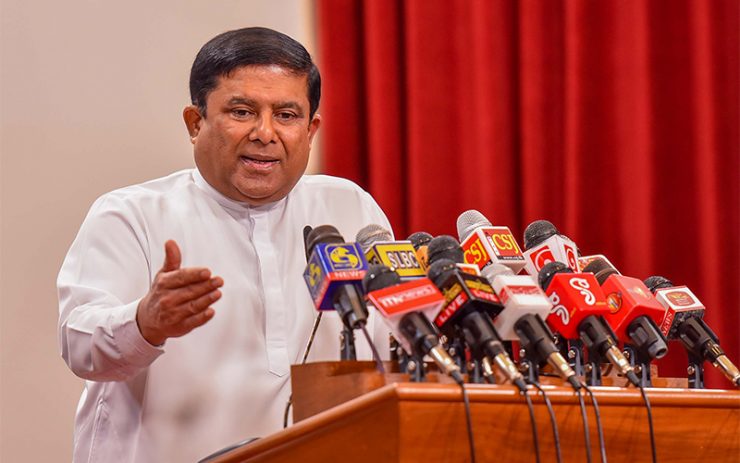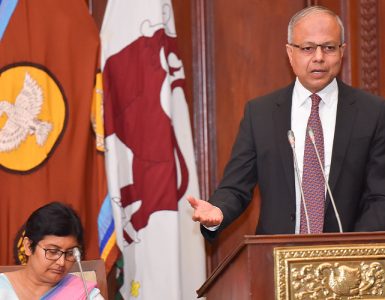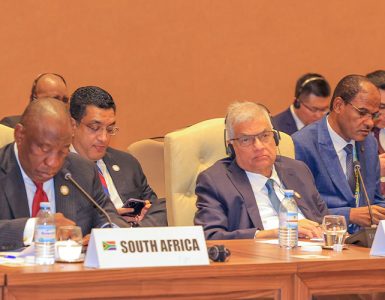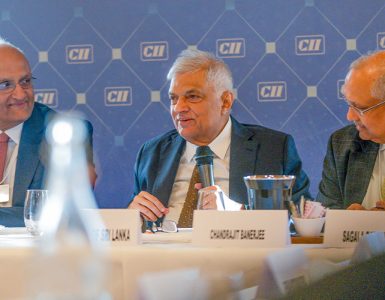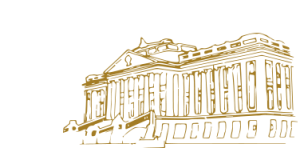The Chairman of the United National Party, Former Minister, and Member of Parliament, Mr. Wajira Abeywardena, emphasized that the present government is dedicated to elevating Sri Lanka’s global standing by ensuring the public’s access to accurate information, drawing inspiration from the significance of the Media Development Authority Act of Singapore in their developmental journey.
The Member of Parliament further highlighted that while everyone enjoys the freedom of social media, regulations will be introduced to deter its misuse for personal attacks or vengeful actions.
Mr. Wajira Abeywardena former Minister and Member of Parliament expressed the following insights during a press conference held today (16) at the Presidential Media Centre under the theme “Collective Path to a stable country.”
Mr. Abeywardena highlighted that the establishment of the Commission on the Safety of Online Systems will serve as an experimental platform for both journalists and citizens. He further noted that individuals spreading defamatory or false information through online systems will face legal consequences and the commission itself does not possess punitive authority.
Expressing his views further Mr. Wajira Abeywardena said;
With the advancement of communication worldwide and in Sri Lanka, people have witnessed various outcomes. However, it’s clear that communication can also be used to mislead and insult citizens. Consequently, those responsible for social media platforms have been striving to establish regulations. In Sri Lanka, there is an ongoing debate about the necessity of such regulations.
The landscape of electronic media in Sri Lanka has undergone significant changes since 1978. Initially, there was limited television coverage in the country. It was only with the establishment of ITN by Mr. Shan Wickremesinghe, the brother of the current President, Mr. Ranil Wickremesinghe, that television expanded. However, it later came under government control. After 1978, the government introduced numerous radio and television channels to replace the sole radio station. The regulation of all television media was governed by Sri Lanka Broadcasting Corporation Act, which lacked comprehensive press development provisions.
In contrast, developed countries across the globe have implemented regulatory frameworks to ensure the accuracy of information and the responsible conduct of media outlets. For instance, the Info‑communications Media Development Authority Act of Singapore has played a pivotal role in Singapore’s development.
Today, especially the younger generation faces considerable discomfort due to the messages disseminated through social media platforms like Facebook, Twitter, Tiktok, Instagram and Youtube. Instances of such platforms negatively impacting young lives, even to the point of suicide, highlight the urgent need for rules and regulations.
It’s important to emphasize that controlling the harmful aspects of information channels, such as Facebook, ensuring the dissemination of accurate information and enforcing laws against those spreading false information are vital for the progress of an educated and developing society.
To strengthen Sri Lanka’s position in Asia and on the global stage, it is essential to enhance the role of the media. A crucial step in this direction would be for all media organizations in Sri Lanka to study the Media Act of Singapore. This act grants full authority to regulate broadcasting services, including the power to grant licenses, revoke them and impose penalties for disseminating inaccurate information. Such measures have contributed to the transformation of countries like Singapore into influential nations worldwide.
Beyond the realm of politics, there is a pressing need to change the culture of spreading falsehoods in Sri Lankan politics. It’s vital to recognize that the media’s responsibility lies in revealing the essential truth, not concealing it.
For instance, it’s imperative for journalists and citizens alike to understand that regulations aim to strengthen the media, not control it. Providing accurate information is a valuable process that benefits the entire nation. To reinforce this, all institutions must unite, offering ideas, suggestions and methods to combat false statements in the media.
Recent actions by our neighbouring country, India, which banned 58 mobile phone applications, including Tiktok, illustrate the importance of such regulations.
Politicians often reference countries like India, Japan, Singapore, South Korea and China as examples of advanced nations, yet they tend to overlook the regulations that underpin their development. In contrast, these countries have comprehensive legal systems and constitutions that have established the necessary rules and regulations to enable them to stand strong on the world stage. As Sri Lankans, it is vital to bring order to the currently disorganized media culture to foster its development and elevate the nation’s intelligence.
One of the primary objectives of the new Broadcasting Regulatory Commission (BRC) bill and the Online Safety Bill is to prevent defamation, false accusations and the destruction of individuals. It is important to note that these regulations aim to create a strong presence for Sri Lanka, both domestically and internationally. The established commission cannot administer punishments; this authority lies with the Magistrate Court or other relevant courts. These new rules and regulations will not only produce responsible journalists but also responsible citizens. They also contribute to the reduction of animosity between nations and affirm the people’s right to access the truth.

